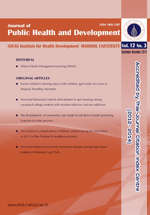Genetic testing for cancer risk
Main Article Content
Abstract
We all agree that “prevention is better than cure”, especially cancer. There are many screening tests for cancers available; however, only a genetic testing was explained in this editorial. Cancer can sometimes appear to “run in families”. The genetic testing examines specific mutations in a person’s chromosomes, genes, or proteins. Mutations that are harmful may increase a person’s chance, or risk, of developing a disease such as cancer. Inherited mutations are thought to play a role in about 5 to 10 percent of all cancers. The genetic testing is done on a small sample of body fluid or tissue - usually blood, but sometimes saliva, cells from inside the cheek, skin cells, or amniotic fluid. Tests are available for some inherited faulty genes. Currently tests are available for gene mutations that increase the risk of breast cancer, bowel cancer, ovarian cancer, womb cancer and prostate cancer.
Article Details
How to Cite
1.
Chompikul J. Genetic testing for cancer risk. J Public Hlth Dev [Internet]. 2015 Dec. 17 [cited 2024 Apr. 26];13(3):1-2. Available from: https://he01.tci-thaijo.org/index.php/AIHD-MU/article/view/43782
Section
Editorial

